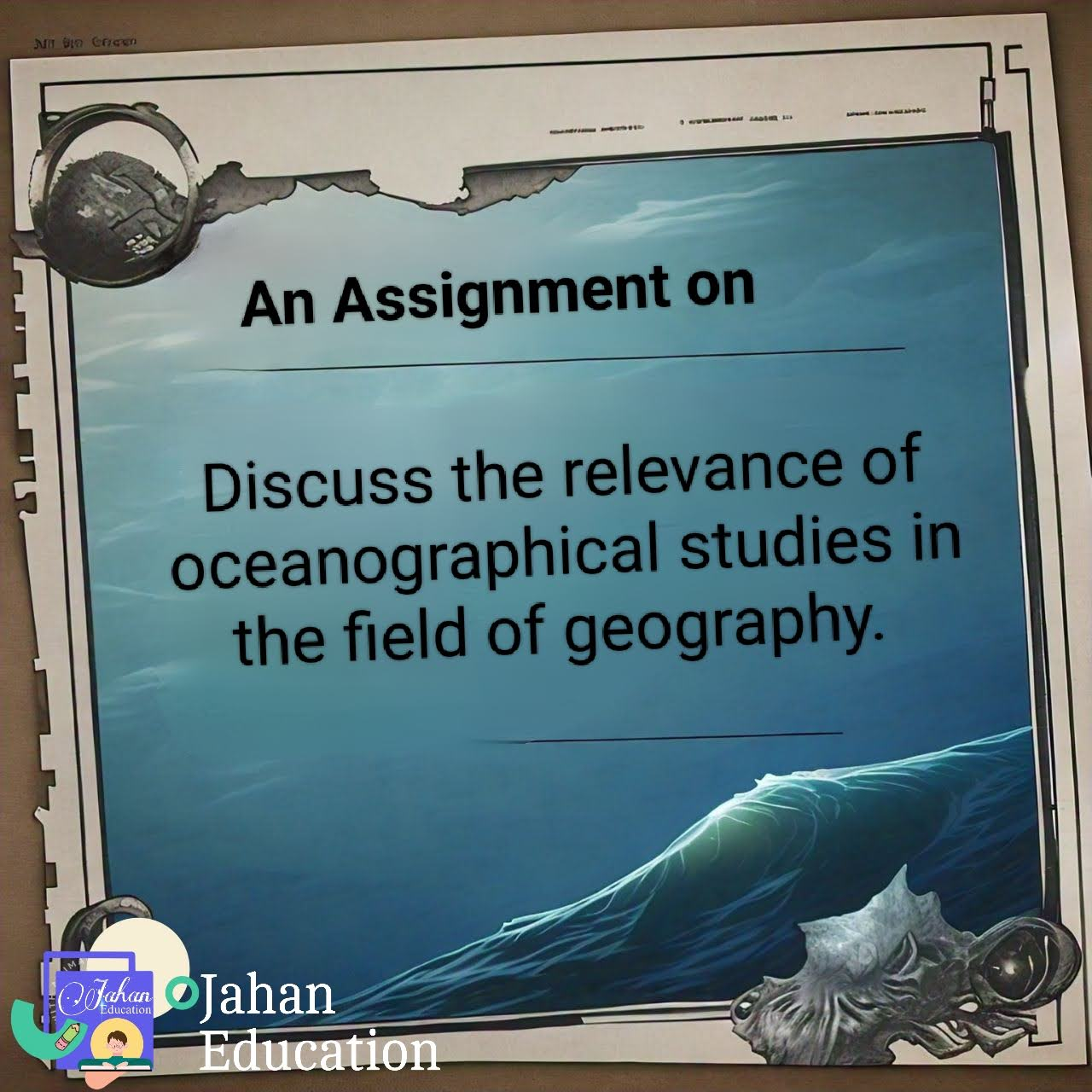[Page1]
Assignment Tittle : Discuss the relevance of oceanographical studies in the field of geography
Introduction :
Oceanographical studies, encompassing the scientific exploration and analysis of oceans, play a pivotal role in the field of geography. Understanding the complexities of ocean systems is integral to comprehending various geographical phenomena, including climate patterns, marine ecosystems, and human-environment interactions. This assignment aims to elucidate the significance of oceanographical research in enhancing our geographical knowledge and its broader implications for environmental management and policy.Background Information :
Oceanography is a multidisciplinary science that examines the physical, chemical, biological, and geological aspects of oceans. It is critical for understanding ocean currents, sea level changes, and marine life, which in turn affect weather systems, climate, and coastal geography. Key concepts include ocean circulation, sea surface temperatures, and marine biodiversity.
Main Body :
1. Impact on Climate and Weather Patterns :
Oceanographical studies provide essential insights into the interactions between oceans and atmospheric conditions. For instance, the El Niño and La Niña phenomena, which are driven by variations in sea surface temperatures, have significant impacts on global weather patterns and climate. Understanding these processes helps geographers predict and manage extreme weather events, such as hurricanes and droughts, which are influenced by oceanic conditions.
2. Coastal and Marine Geography :
Coastal geography is profoundly affected by oceanographical research. Studying wave dynamics, tidal patterns, and coastal erosion helps in the management and preservation of coastal areas. Oceanographical data is crucial for understanding coastal landforms, assessing vulnerability to sea-level rise, and developing strategies for sustainable coastal development.
3. Marine Ecosystems and Biodiversity :
The health and stability of marine ecosystems are closely linked to geographical and environmental factors. Oceanographical studies contribute to our knowledge of marine biodiversity, the distribution of marine species, and the impacts of human activities such as overfishing and pollution. This information is vital for conservation efforts and for managing marine resources sustainably.
4. Resource Management and Environmental Protection :
Oceanographic research informs the management of marine resources, including fisheries and mineral deposits. By understanding oceanographic conditions, geographers can better assess the potential for resource exploitation while minimizing environmental impacts. This includes the development of strategies for mitigating pollution, managing marine reserves, and addressing the effects of climate change on ocean resources.
Analysis/Discussion :
Oceanographical studies are indispensable for a comprehensive understanding of geographical processes. The integration of oceanographic data into geographical research enhances our ability to predict and respond to environmental changes, manage natural resources, and protect marine and coastal environments. The interdisciplinary nature of oceanography, combining elements of physics, chemistry, biology, and geology, enriches geographical analysis and provides a holistic view of Earth’s systems.
The relevance of oceanography extends beyond academic interest; it has practical implications for policy-making, disaster management, and environmental conservation. As global challenges such as climate change and marine pollution become increasingly pressing, the insights gained from oceanographical research are crucial for informed decision-making and sustainable development.
Conclusion :
In summary, oceanographical studies are fundamental to the field of geography, offering valuable insights into climate dynamics, coastal processes, marine ecosystems, and resource management. The knowledge gained from these studies is vital for addressing contemporary environmental challenges and fostering sustainable practices. As our understanding of ocean systems continues to evolve, it will further enhance our ability to navigate and manage the intricate relationship between oceans and terrestrial environments.
Smith, J. (2020).

.jpg)

.jpg)













0 Comments